| Srl | Item |
| 1 |
ID:
169556
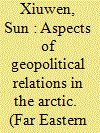

|
|
|
|
|
| Summary/Abstract |
The phenomenon of cognitive dissonance among regional and extraregional players in Arctic issues is considered, along with the reasons for it, its consequences, and measures that allow it to be reduced. The main reason for such disagreements is national identity, the categorization of which creates differences between "ours" and "theirs." It is easier for countries with similar identities to see reality the same way and develop cooperation.
|
|
|
|
|
|
|
|
|
|
|
|
|
|
|
|
| 2 |
ID:
170539
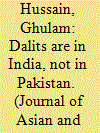

|
|
|
|
|
| Summary/Abstract |
This paper is an attempt to investigate the discursive bases of the categorical and identity-based choices available to the Dalits under the Ashrafia hegemony, and the resultant denial of Dalitness prevalent among the Dalits and the Sindhi civil society in, Pakistan. Informed by the Ambedkarian (subaltern) perspective, I analyse the conversational interviews conducted with the Dalit activists (mostly Scheduled Castes), and with their Ashrafia class counterparts. Interrogating the superior status of Sayed caste(s), I contend that the the denial of casteism, the opposition to the use of the ‘Dalit’ identity marker and the negation of the Dalitness seemed to have as much to do with the belief in Ashrafia values as it had with the normative sanction of the Savarna. values.Both the Savarna and the Ashrafia values seemed to seek legitimacy from the dominant ethnocentric forms of the politicized Sufism. Political Sufism merges the Savarna and Ashrafia norms by means of the syncretic narrative based on interfaith harmony and the civilisational rhetoric. Ashrafisation (also Savarnisation) and the reverence towards Sayeds were the key self-perpetuating hegemonic processes underlying the attempts by the Dalits and the civil society activists to dissipate cognitive dissonance underlying the existing Dalitness and the Ashrafia hegemony. I, therefore, conclude that the practices and the narratives prevalent in Sindhi civil society undermined the Dalit agency to come up with their own counter-hegemonic and emancipatory narrative(s).
|
|
|
|
|
|
|
|
|
|
|
|
|
|
|
|
| 3 |
ID:
112390
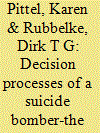

|
|
|
|
|
| Publication |
2012.
|
| Summary/Abstract |
This paper provides a theoretical analysis of suicide attacks and defection. First, decision processes of potential attackers are examined from an economist's perspective. The results are then applied to insights from behavioural economics and psychology. We derive conditions under which agents decide to become suicide bombers-or to announce an attack and defect later. Taking account of hyperbolic discounting we show why the decision to commit a suicide attack can be time-inconsistent and what internal manipulation mechanisms (arising from cognitive dissonance and terror management) and external manipulation mechanisms (employed by terrorist organizations and governments) might prevent or foster time-inconsistency.
|
|
|
|
|
|
|
|
|
|
|
|
|
|
|
|
| 4 |
ID:
185179
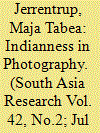

|
|
|
|
|
| Summary/Abstract |
This article explores the question whether there is a specifically Indian style of photography. A survey of photography students from various institutions revealed that though there is little clarity about the actual look of an Indian style of photography, students clearly define their own photographs as Indian. Intriguingly, the focus is less on certain visual characteristics, but more on the feelings they derive from the photographs, a scenario which is reminiscent of the rasa theory. Even though this was hardly mentioned by the students, this psycho-social element seems to have left a cultural imprint but also reflects an act of claiming ownership and agency. In addition, the students identified alienating aspects in photography, such as seeing one’s own culture like an outsider, but at the same time consider it to be integrating, since photography paves the way for a deeper engagement with one’s own culture, and as such strengthens Indianness.
|
|
|
|
|
|
|
|
|
|
|
|
|
|
|
|
| 5 |
ID:
188051


|
|
|
|
|
| Summary/Abstract |
The fall of the Islamic State in Iraq and Syria (ISIS) has raised a number of questions over the future of the organization and the potential threat it might continue to pose. While some commenters argue that the demise of the Caliphate will reduce ISIS’s global appeal, others have stressed the role that jihadi supporters may play in perpetuating ISIS’s ideological legacy. Yet, little is known on how supporters have responded to recent changes in circumstances. Employing a cognitive dissonance approach, this contribution examines the implications of ISIS’s defeat on twelve jihadi supporters’ commitment. It shows that while a minority of supporters have disengaged, the majority have remained committed to the group. While these differences stress the influence of personal situational factors on supporters’ responses, the data at the same time indicates that dissonance has preceded in some cases ISIS’s defeat. The contribution overall shows that integrating cognitive dissonance theory to the study of radicalization and terrorism can provide a more nuanced understanding of how individuals renegotiate the nature of their involvement in extremism when confronted by changes in circumstances.
|
|
|
|
|
|
|
|
|
|
|
|
|
|
|
|
| 6 |
ID:
187995
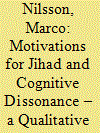

|
|
|
|
|
| Summary/Abstract |
This study is based on interviews with three former Swedish jihadists, and it uses cognitive dissonance theory to analyze how their motivations for jihad changed—from the early stages of radicalization to fighting as part of a jihadist group and finally leaving jihad. It argues that cognitive dissonance is a causal mechanism, alternative to empathy and collective relative deprivation, that can explain how individuals with collective identities can be motivated to opt for jihad. For none of the interviewees did fundamentalist Islam provide a gateway into jihadism, nor did they seem to use Islam as a mere justification for violent behavior. Cognitive dissonance can also shed light on why some jihadists have not been susceptible to further radicalization by accepting even more radical ideas.
|
|
|
|
|
|
|
|
|
|
|
|
|
|
|
|
| 7 |
ID:
147657
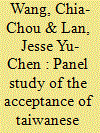

|
|
|
|
|
| Summary/Abstract |
Chinese students studying in Taiwan provide a possible approach for Taiwan to overcome international position dilemmas. Regarding changes in participants’ acceptance of Taiwanese international participation, we found that 43.75% exhibited increased acceptance. The regression model employed in this research explained 26.36% of the variance.
|
|
|
|
|
|
|
|
|
|
|
|
|
|
|
|
| 8 |
ID:
078409


|
|
|
|
|
| Summary/Abstract |
How do attachments to political parties among the mass publics of East Asia affect the process of democratization in the region? Analyses of the East Asia Barometer surveys reveal that partisanship motivates East Asians to endorse the democratic performance of their political system and embrace democracy as the best possible system of government. These findings accord, by and large, with the socialization, cognitive dissonance, and rational choice theories of partisanship
|
|
|
|
|
|
|
|
|
|
|
|
|
|
|
|